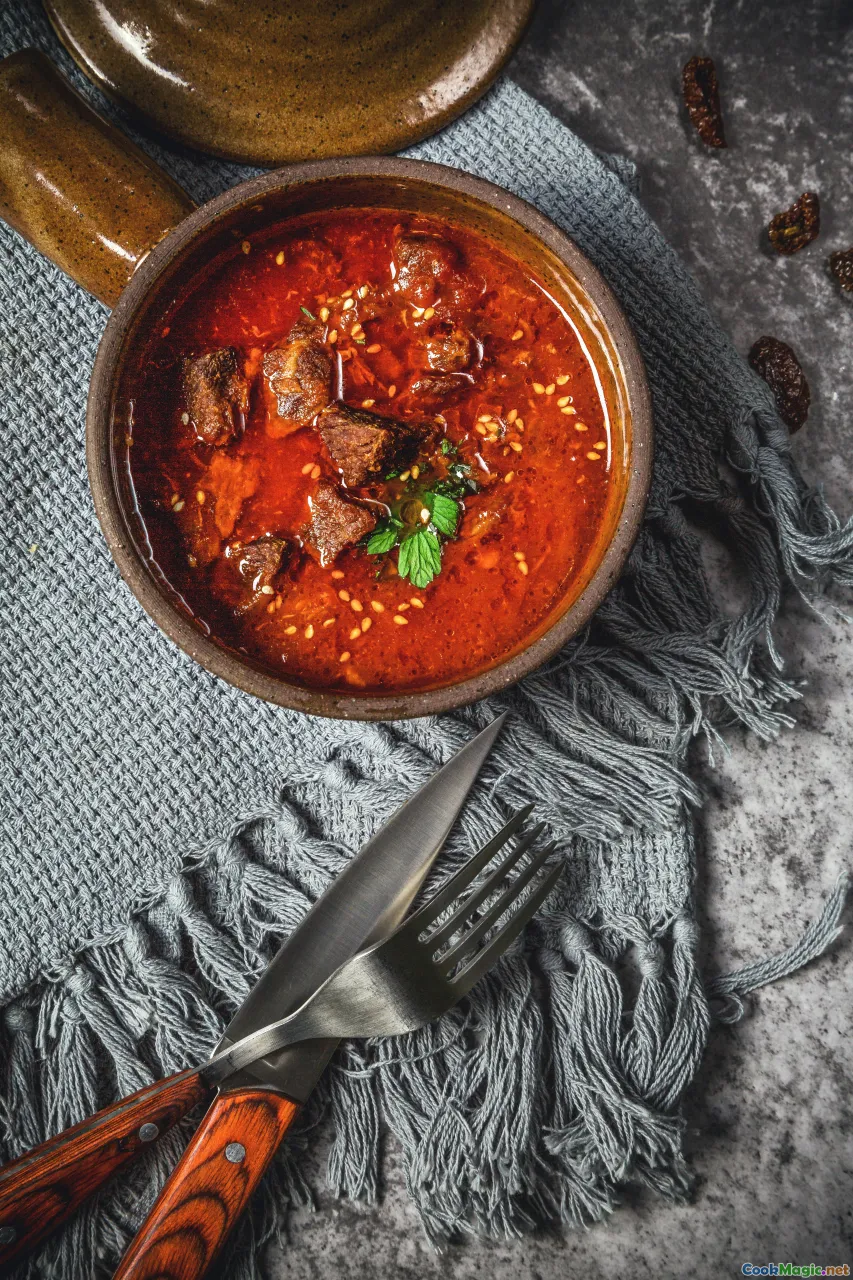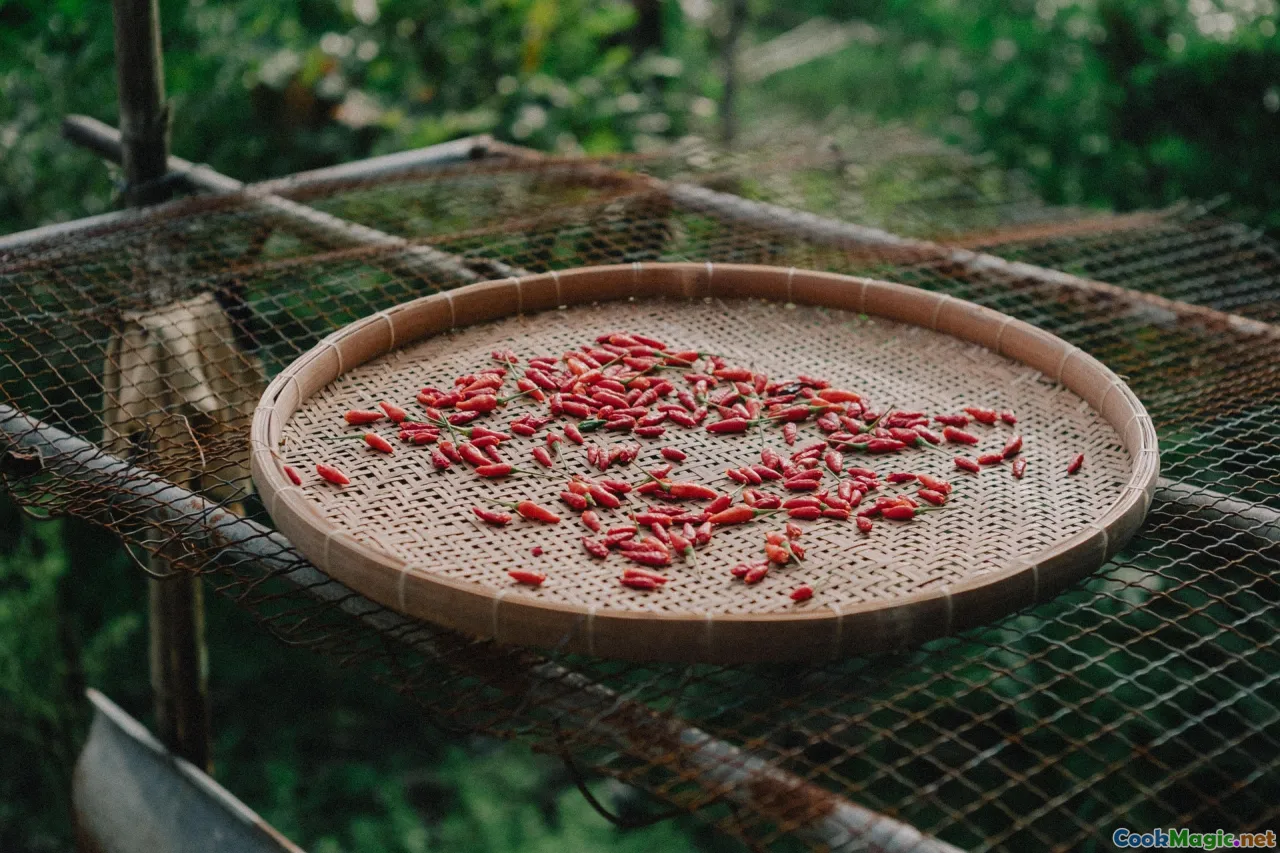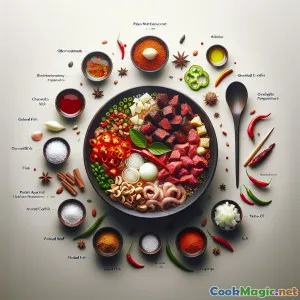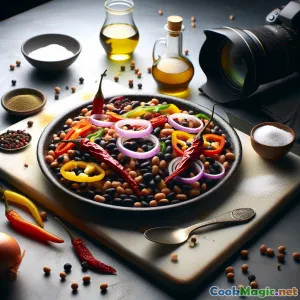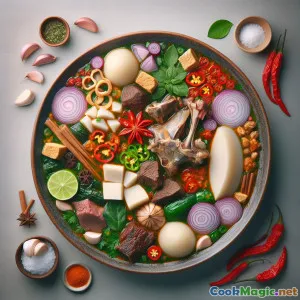
Zuppa di Yam speziata Ukodo: Ciotola di conforto nigeriana
(Peppery Ukodo Yam Soup: Nigerian Comfort Bowl)
(0 Recensioni)0
22
agosto 10, 2025
Segnala un problema
Ingredienti
-
800 grams Yam (igname bianco africano, pelato)
(Cut into thick chunks)
-
500 grams Carne di manzo o capra con osso
(Tail, brisket, or shank preferred for depth of flavor)
-
2 tbsp Miscela di spezie per zuppa di pepe
(Blend of African spices like uda, ehuru (calabash nutmeg), and uziza seeds)
-
2 whole Peperoncino Scotch bonnet fresco
(Use more or less to taste; keep whole for a milder effect)
-
1 large cipolle rosse
(A dadini)
-
2 cm knob Radice di zenzero fresco
(Grated or minced)
-
3 medium Spicchi d'aglio
(Schiacciato)
-
2 liters Acqua
-
2 cubes Cubetti di Condimento
(Maggi or any bouillon)
-
1.5 tsp Sale
(Regolare a piacere)
-
2 tbsp Foglie di sente aromatiche fresche o prezzemolo tritato
(Traditional: scent leaves; parsley as a substitute)
-
4 pieces Spicchi di lime
(For garnish and brightening up flavors)
(Cut into thick chunks)
(Tail, brisket, or shank preferred for depth of flavor)
(Blend of African spices like uda, ehuru (calabash nutmeg), and uziza seeds)
(Use more or less to taste; keep whole for a milder effect)
(A dadini)
(Grated or minced)
(Schiacciato)
(Maggi or any bouillon)
(Regolare a piacere)
(Traditional: scent leaves; parsley as a substitute)
(For garnish and brightening up flavors)
Nutrizione
- Porzioni: 4
- Dimensione Porzione: 1 ciotola (350g)
- Calories: 410 kcal
- Carbohydrates: 48 g
- Protein: 22 g
- Fat: 15 g
- Fiber: 5 g
- Sugar: 4 g
- Sodium: 1500 mg
- Cholesterol: 65 mg
- Calcium: 70 mg
- Iron: 3.2 mg
Istruzioni
-
1 - Prepare Ingredients:
Peel and cut yam into chunky rounds, rinse meat thoroughly, dice onion, grate ginger, and crush garlic. Measure spices and chop herbs (if using).
-
2 - Cook the Meat:
Place meat and bones into a large pot. Add onions, garlic, ginger, seasoning cubes, and half the salt. Pour in water until covered, bring to a boil, then reduce to a simmer. Cook for 20-25 minutes until the meat starts to soften and broth is rich.
-
3 - Add Spices and Yam:
Add the pepper soup spice mix and whole Scotch bonnet(s). Stir well, then gently introduce the yam chunks. Add more water as needed to submerge ingredients.
-
4 - Simmer Soup:
Simmer uncovered for 25-30 minutes, until yams are tender and broth is well-infused. Adjust salt and season to taste. If using, stir fresh herbs through just before removing from heat.
-
5 - Serve:
Ladle generous portions of yam, meat, and broth into bowls. Garnish with herbs or a lime wedge for brightness. Serve hot and enjoy immediately.
Peel and cut yam into chunky rounds, rinse meat thoroughly, dice onion, grate ginger, and crush garlic. Measure spices and chop herbs (if using).
Place meat and bones into a large pot. Add onions, garlic, ginger, seasoning cubes, and half the salt. Pour in water until covered, bring to a boil, then reduce to a simmer. Cook for 20-25 minutes until the meat starts to soften and broth is rich.
Add the pepper soup spice mix and whole Scotch bonnet(s). Stir well, then gently introduce the yam chunks. Add more water as needed to submerge ingredients.
Simmer uncovered for 25-30 minutes, until yams are tender and broth is well-infused. Adjust salt and season to taste. If using, stir fresh herbs through just before removing from heat.
Ladle generous portions of yam, meat, and broth into bowls. Garnish with herbs or a lime wedge for brightness. Serve hot and enjoy immediately.
Ulteriori informazioni su: Zuppa di Yam speziata Ukodo: Ciotola di conforto nigeriana
Ukodo: Peppery Yam Pepper Soup
Ukodo, or Yam Pepper Soup, is more than just a meal in Nigeria—it is a deeply cultural dish, woven into celebrations and traditional healing rituals, especially among the Urhobo and Isoko peoples of southern Nigeria. It’s a heartwarming Nigerian pepper soup variant known for combining succulent cuts of beef or goat with yams in a delicately peppery broth. What sets Ukodo apart is not just its abundant spice while remaining more soup-like than a stew, but the soul-restoring, communal spirit it brings to the table.
A Comfort Dish with Depth
Ukodo's backbone lies in its pepper soup spice mix—aromatic African spices (ehuru or calabash nutmeg, uda seeds, and uziza). These, often unfamiliar to global palates, form brilliant layers of flavor: nutty, camphorous, slightly smoky, and floral all at once. Fiery Scotch bonnet (or habanero) lends not just heat but a distinctly fruity bouquet, marrying handsomely with the subtle earthiness of large white yam chunks. Yams here are not just for substance—their starch thickens the soup slightly, offering body without turning the brothy consistency into a heavy stew.
The Heartbeat of Occasions
Ukodo is characteristically served at communal gatherings: weddings, naming ceremonies, or comforting the sick. Its use as a remedy (aiding coughs, soothing colds) and hangover cure makes it legendary across Niger State as well as Delta State. Families treasure a steaming pot of Ukodo for Sunday brunches and intimate family feasts, with everyone savoring the spicy broth and filling yam alongside generous morsels of meat.
Tips for the Perfect Ukodo
- Meat Choices: Use bony cuts or a stew pack: the slow simmer yields rich flavor and connective tissue silkiness in the broth. Tail ends, brisket, or shank work superbly. Goat meat, if available, will give even more character.
- Yam Texture: African yam is firm and never mushy when boiled properly. If substituting, opt for starchy, New World-type yams or potatoes (if absolutely necessary).
- Spice Level: Leave Scotch bonnets whole for moderate spice or slice for extra kick. Taste during cooking and remove or adjust as needed.
- Pepper Soup Spices: Ready mixes are available at African groceries, or you can blend your own (ehuru/calabash nutmeg + uziza/Afro pepper + uda/negro pepper).
- Herbs: Whenever you can, use Nchuanwu (scent leaves), but Italian parsley or a touch of basil subs in a pinch. Finish with a squeeze of lime for brightness and balance in the very last minute.
Histories and Heritage
West African food carries stories, and Ukodo’s story is a tale of both celebration and nurturance. In southern Nigeria, it remains seen as a healing password—the answer when hearts grieve, or heads ache after a night of fun. It travels across festive tables, always prepared in large pots for wide sharing, denoting festivity and communal harmony. The indigenous pepper soup spice mix is a badge of Nigerian culinary ingenuity, blending seeds and wild nuts less known beyond Africa.
Unique Aspects and Impressions
Ukodo stands out for using yam instead of less earthy vegetables like boiled plantain. Its nutritious nature (providing filling carbs, moderate proteins, and a warm hit of healthy spices) makes it satisfying yet light. The tradition of serving with the pepper itself (floating in the broth, unsliced for gentle flavoring) is at once dramatic and practical—a negotiation of robust taste for both spice devotees and mild palates.
Serving Suggestions
Serve with additional fresh chilies, a simple side of green vegetables, or cold lager on a hot day. In homes, a pot of Ukodo becomes an all-day event—the leftovers, if any, intensifying in aroma by the next morning.
Personal Thoughts
Recreating Ukodo away from Nigeria inevitably weaves together longing and flavor memory: toasting whole pepper soup spices before grinding releases their profound scents, reminding of distant open-air markets. The balance of yam (with its slightly nutty aftertaste and ability to stand up to bold spices), savory, gelatin-rich meat, and emboldened peppers offers this recipe a memorable structure few soups match.
In an age of comfort food, Ukodo remains irreplaceable—a taste of tradition, warmth, and the profound togetherness at the core of Nigerian cuisine.


